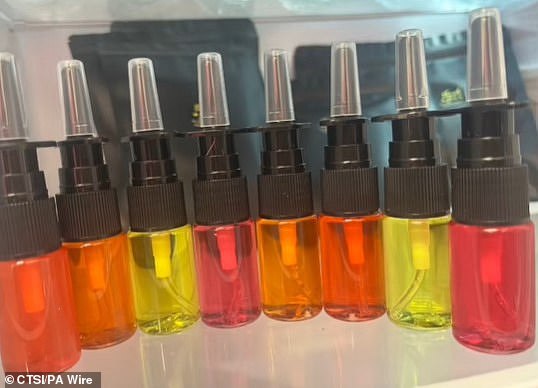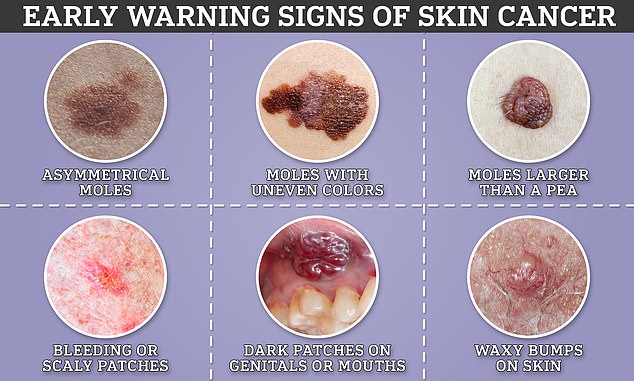Nasal tanning sprays that have been linked to deadly skin cancer are being widely sold across social media platforms, experts have warned.
The unregulated sprays–which claim to accelerate tanning–may also trigger nausea, vomiting, and high blood pressure according to the Chartered Trading Standards Institute (CTSI).
The CTSI is now urging the public to avoid any tanning product that is ‘inhaled or ingested’.
The sprays claim to work by delivering a substance known as Melanotan 2, a chemical that darkens skin pigmentation and which is banned in the UK.
While this creates a tan it ‘may also encourage abnormal skin cell changes in response to UV exposure’, according to the Melanoma Fund.
It’s these changes that can potentially lead to melanoma, the deadliest form of skin cancer.
However, as the sprays are marketed as a cosmetic product rather than a medicine they are not as tightly regulated and have surged in popularity.
According to the British Beauty Council, the self-tan market is set to hit £746.3 million by 2027.
The CTSI also raised the alarm on the growing trend of people using flavoured nasal tanning sprays, drops and gummies.

CTSI have issued an urgent warning over nasal tanning sprays. Some examples pictured here

Signs of skin cancer range from innocuous to obvious, but experts warn that treating cases early is key to making sure they do not spread or further develop
They warned that ‘unscrupulous’ sellers on Facebook and TikTok were posting pictures of the products available in child-friendly flavours such as peach, bubblegum, grape, strawberry and lime.
The regulator said it feared they could become the latest ‘must have’ products among young people ‘leading to a youth epidemic as we saw with disposable vapes’.
Susanna Daniels, chief executive of the skin-cancer charity Melanoma Focus, said: ‘We’re becoming increasingly concerned about the use of both nasal tanning sprays and tanning injections and their potential links with melanoma skin cancer.
‘These unregulated and illegal products not only pose serious health risks but also encourage harmful behaviours, particularly among young consumers.
‘We urge the public to consider the long-term impacts on their health and avoid using these substances altogether.’
Gary Lipman, chairman at the Sunbed Association, added: ‘Nasal sprays have absolutely no place in a professional tanning salon.

Jen Atkin used the £25 product twice and a dark brown mark appeared ‘out of absolutely nowhere’ on her forehead, which hasn’t budged since
‘We fully support CTSI’s campaign to heighten awareness of the dangers of using them.’
Some British patients have already been harmed by the products.
Jen Atkin, a former Miss Great Britain winner from Grimsby, Lincolnshire, said she has been permanently scarred after using a nasal tanning spray she bought on Instagram.
‘Unfortunately, I decided to go to extra lengths and fell into the trend of nasal tan,’ she said.
Ms Atkin used the £25 product twice and a dark brown mark appeared ‘out of absolutely nowhere’ on her forehead.
She added: ‘It scared the life out of me. It made me feel so nauseous and weird.’
Melanoma is a serious form of skin cancer that begins in melanocytes, cells found in the upper layer of skin that produce melanin, which gives skin its colour.
While less common than other types of skin cancer, it is more dangerous because of its ability to spread to other organs more rapidly if it is not treated at an early stage.
Around 17,000 people are diagnosed with melanoma each year, according to the latest figures published on the Cancer Research UK website.
Almost nine in ten people diagnosed with melanoma survive ten years or more.
There is an annual average of 2,300 deaths from the skin cancer, according to the charity, with it accounting for around 1 per cent of cancer deaths.












